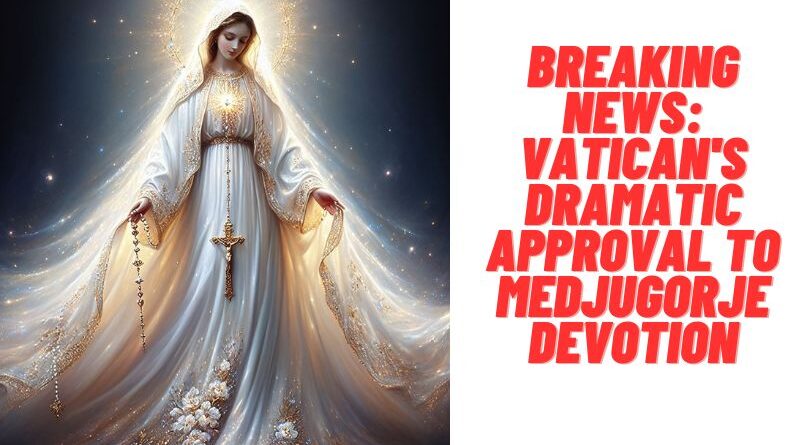Breaking News: Vatican’s Dramatic Approval to Medjugorje Devotion
The Dicastery for the Doctrine of the Faith, with the assent of Pope Francis, grants approval for devotion linked to Medjugorje, recognizing the abundant spiritual fruits received at the Sanctuary of the Queen of Peace without making a declaration on the alleged supernatural character of Marian apparitions.
Vatican City, September 19, 2024 – In a significant development, the Vatican has issued a cautious green light for the spiritual practices associated with the alleged Marian apparitions in Medjugorje, Bosnia and Herzegovina. While not definitively endorsing the supernatural character of the events, the Vatican’s Dicastery for the Doctrine of the Faith has recognized the abundant spiritual fruits that have come from the site.
The decision, announced in a document titled “The Queen of Peace: Note About the Spiritual Experience Connected with Medjugorje,” allows for the faithful to benefit from the spiritual phenomena reported at Medjugorje, provided certain clarifications are understood. The Vatican has granted a “nihil obstat” (Latin for “nothing obstructs”), authorizing public acts of devotion related to the site.
The Vatican’s assessment is based on a careful examination of the alleged Marian messages, as well as the numerous positive fruits associated with the Medjugorje experience. These include conversions, returns to the sacraments, vocations, and a deepening of faith. However, the Vatican also notes that some of the messages may contain problematic elements, such as references to Mary’s “plan” or “project,” which could potentially create confusion about the role of Christ.
While the Vatican’s decision is a significant step forward, it does not definitively resolve the ongoing debate about the authenticity of the Medjugorje apparitions. The Catholic Church continues to investigate the claims of the visionaries, and the final judgment on the matter may still be years away.
In the meantime, the Vatican’s approval of the spiritual practices associated with Medjugorje is likely to encourage more pilgrims to visit the site, which has already become a major pilgrimage destination for Catholics from around the world. 1

The message of peace
The Dicastery’s Note continues by examining the central aspects of the messages, starting with that of peace understood not only as the absence of war but also in a spiritual, familial, and social sense. The most original title that Mary attributes to herself is indeed
“Queen of Peace.”
“I have presented myself here as the Queen of Peace to tell everyone that peace is necessary for the salvation of the world. Only in God can you find true joy, which is the source of true peace. Therefore, I ask for conversion” (June 16, 1983).
This peace is the fruit of lived charity, which “also implies a love for those who are not Catholic,” an aspect better understood “in the ecumenical and interreligious context of Bosnia and Herzegovina, which has been marked by a terrible war with strong religious components.”
God at the center
There is a frequent invitation to confident abandonment to God who is love: “We can see a nucleus of messages in which Our Lady does not place herself at the center but shows herself to be fully directed toward our union with God.”
Furthermore, “the intercession and work of Mary are shown to be clearly subordinate to Jesus Christ, who is the author of grace and salvation for every person.”
Mary intercedes, but it is Christ who “gives the strength. Therefore, her whole maternal work consists in motivating us to turn to Christ.”
“He will give you strength and joy in this time. I am close to you with my intercession” (November 25, 1993).
Additionally, many messages invite the faithful to recognize the importance of seeking the help of the Holy Spirit: “People are wrong when they turn solely to the saints to ask for something. The important thing is to pray to the Holy Spirit to descend upon you. When you have him, you have everything” (October 21, 1983).
Call to conversion
The messages also contain “constant call to abandon a worldly lifestyle and excessive attachment to worldly goods appears in the messages, along with frequent calls for conversion, which makes true peace in the world possible.”
Conversion seems to be the focal point of the Medjugorje message. There is also “an insistent exhortation not to underestimate the gravity of evil and sin, and to take very seriously God’s call to fight against evil and the influence of Satan,” indicated as the origin of hatred, violence, and division.
Prayer and fasting are also essential to the message of Medjugorje, as well as the centrality of the Mass, the importance of fraternal communion, and the search for the ultimate meaning of existence in eternal life.



